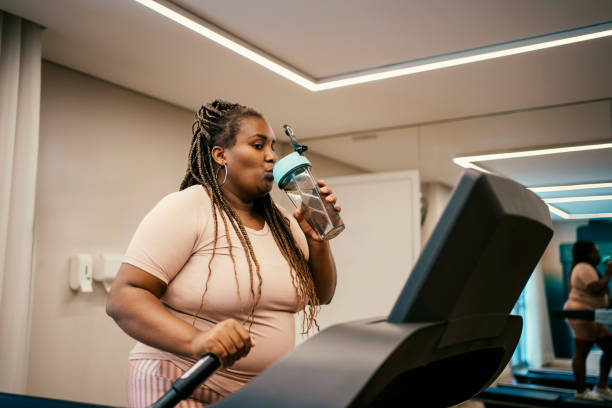(BlackFitness101.com) As a fitness trainer, one of the most common questions I encounter is whether it’s okay to consume alcohol while pursuing fitness goals. The simple answer is that alcohol and fitness are not a good mix. While it might be tempting to unwind with a drink after a hard workout or a long week, alcohol can have detrimental effects on your fitness progress. In this article, we will delve into the reasons why alcohol is bad for those who are serious about their fitness journey.

Impact on Muscle Recovery and Growth
Inhibition of Protein Synthesis
One of the most critical aspects of fitness, especially for those looking to build muscle, is protein synthesis. Protein synthesis is the process by which the body repairs and builds muscle tissue after exercise. Alcohol consumption has been shown to inhibit protein synthesis. Studies indicate that alcohol can decrease muscle protein synthesis by as much as 37% post-exercise. This inhibition significantly hampers muscle recovery and growth, negating the hard work put in during workouts.
Dehydration and Muscle Cramps
Alcohol is a diuretic, meaning it increases urine production and leads to dehydration. Dehydration can cause muscle cramps, fatigue, and a decrease in performance. When you’re dehydrated, your muscles lose efficiency, making it harder to complete workouts and increasing the risk of injury. Staying hydrated is crucial for optimal muscle function and recovery, and alcohol directly counteracts this need.
Negative Effects on Sleep
Disrupted Sleep Patterns
Sleep is an essential component of any fitness regimen. It’s during sleep that the body repairs itself and grows stronger. Alcohol disrupts sleep patterns, particularly the Rapid Eye Movement (REM) sleep, which is the most restorative phase. Even though alcohol might help you fall asleep faster, it reduces the quality of sleep, leading to less restorative rest. Poor sleep quality can result in decreased energy levels, impaired cognitive function, and slower recovery times from workouts.
Reduced Growth Hormone Production
Growth hormone (GH) plays a crucial role in muscle growth, fat metabolism, and overall recovery. The production of GH primarily occurs during deep sleep. Alcohol consumption before bed has been shown to significantly reduce the amount of GH released during the night. This reduction in growth hormone can hinder muscle recovery and growth, making it harder to achieve fitness goals.
Impact on Metabolism and Fat Loss
Increased Caloric Intake
Alcohol contains empty calories that provide no nutritional benefit. These calories can add up quickly, especially with high-calorie alcoholic beverages like cocktails and beer. Increased caloric intake from alcohol can lead to weight gain, counteracting efforts to lose fat and maintain a healthy weight. Moreover, alcohol can increase appetite and lower inhibitions, leading to overeating and poor food choices.
Impaired Fat Metabolism
When alcohol is consumed, the body prioritizes its metabolism over other nutrients like carbohydrates, fats, and proteins. This is because alcohol is a toxin, and the body works to eliminate it as quickly as possible. As a result, fat metabolism is put on hold. This can lead to increased fat storage, particularly in the abdominal area, which is associated with higher health risks.
Decreased Performance and Coordination
Impaired Motor Skills
Alcohol affects the central nervous system, impairing motor skills and coordination. For those engaging in physical activities that require precision and balance, such as weightlifting, running, or yoga, alcohol consumption can lead to poor performance and increased risk of injury. Even moderate drinking can impair motor skills for up to 72 hours, making it difficult to perform at your best.
Decreased Endurance
Alcohol consumption can also reduce cardiovascular endurance. Alcohol causes blood vessels to dilate, which can lead to a drop in blood pressure and a decrease in oxygen delivery to muscles. This can result in decreased stamina and endurance, making it harder to sustain high-intensity workouts or long-duration exercises.
Hormonal Imbalances
Testosterone Levels
Testosterone is a critical hormone for muscle growth and overall fitness. Alcohol consumption has been shown to decrease testosterone levels, particularly in men. Lower testosterone levels can result in decreased muscle mass, increased body fat, and reduced strength and stamina. This hormonal imbalance can significantly hinder progress in achieving fitness goals.
Cortisol Levels
Cortisol is a stress hormone that can have catabolic effects, meaning it can break down muscle tissue. Alcohol consumption can increase cortisol levels, particularly when consumed in large quantities or over prolonged periods. Elevated cortisol levels can lead to muscle loss, increased fat storage, and a weakened immune system, all of which are detrimental to fitness progress.
Psychological and Behavioral Impact
Decreased Motivation
Regular alcohol consumption can lead to decreased motivation to exercise. Alcohol can cause feelings of lethargy and decrease energy levels, making it harder to find the drive to work out. Additionally, hangovers can make it challenging to stick to a regular exercise routine, leading to missed workouts and stalled progress.
Poor Decision Making
Alcohol impairs judgment and decision-making abilities. This can lead to poor choices related to diet and exercise, such as skipping workouts, eating unhealthy foods, or neglecting proper recovery practices. Consistent poor decision-making can derail fitness goals and lead to a cycle of inconsistency and frustration.
Increased Risk of Injury
Impaired Healing and Recovery
As mentioned earlier, alcohol inhibits protein synthesis and disrupts sleep, both of which are critical for recovery. Additionally, alcohol can impair the body’s ability to heal from injuries. It reduces the production of collagen, a protein essential for the repair of connective tissues like tendons and ligaments. This can result in prolonged recovery times and an increased risk of chronic injuries.
Decreased Immune Function
Regular alcohol consumption can weaken the immune system, making the body more susceptible to infections and illnesses. A compromised immune system can lead to more frequent and prolonged periods of sickness, which can disrupt training routines and delay progress. Maintaining a strong immune system is essential for consistent and effective training.
Long-Term Health Risks
Liver Damage
The liver is responsible for metabolizing alcohol, and excessive consumption can lead to liver damage. Conditions like fatty liver disease, hepatitis, and cirrhosis are common in heavy drinkers. A healthy liver is essential for overall health and fitness, as it plays a critical role in metabolizing nutrients and detoxifying the body.
Cardiovascular Health
Alcohol can have both immediate and long-term effects on cardiovascular health. In the short term, it can cause irregular heart rhythms and increased blood pressure. Long-term excessive alcohol consumption can lead to cardiomyopathy, a condition where the heart muscle weakens and cannot pump blood effectively. Maintaining a healthy cardiovascular system is crucial for endurance and overall fitness.
The Bottom Line for Fitness Enthusiasts
For those serious about their fitness journey, it is clear that alcohol consumption can have numerous negative effects. From inhibiting muscle growth and recovery to impairing sleep and metabolism, alcohol poses significant challenges to achieving fitness goals. Additionally, the impact on performance, coordination, and overall health further underscores the importance of minimizing alcohol intake.
As a fitness trainer, my advice is to prioritize your health and fitness goals by making mindful choices about alcohol consumption. If you choose to drink, do so in moderation and be aware of the potential impacts on your progress. Remember, every decision you make can either bring you closer to or further from your goals. By understanding the detrimental effects of alcohol on fitness, you can make informed choices that support your journey towards a healthier, stronger, and more vibrant life.
Staff Writer; Leroy Smith
Questions? Feel free to email me at; LSmith@BlackFitness101.com.












Leave a Reply